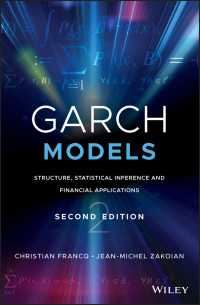Full Description
This book is a groundbreaking and original contribution to understanding the intersectionality of caste, race, and class in South Asia. Grounded in rich ethnographic fieldwork, it situates its analyses in Pakistan to reveal how caste—often denied or obscured by nationalist, religious, and liberal-progressive discourses—continues to shape everyday hierarchies, moral imaginaries, and political structures. It unravels how both privileged and oppressed caste groups invoke the past to construct identities and contest histories in the present, showing how systemic discrimination has pushed Scheduled Castes and Pasmanda communities to the lowest rungs of the social, economic, and political hierarchy. Moving beyond the familiar frames of Indian caste practices, the book demonstrates that caste in Pakistan is not a relic of the past or a "Hindu problem," but a transreligious and deeply entrenched social structure sustained across Hindu, Muslim, and Christian communities alike. Foregrounding caste as an analytic category and a fundamental marker of identity, the book interrogates the role of hegemonic actors—religious, nationalist, and secular—in strategically denying or reasserting caste to preserve structures of privilege. Combining theoretical sophistication with moral and ethnographic engagement, Architecture of Caste in Pakistan compels a rethinking of caste, religion, and equality in Muslim societies.
This volume will be of great interest to scholars and researchers of caste and discrimination studies, critical Dalit and Pasmanda studies, sociology, social anthropology, and South Asian studies.
Contents
Chapter 1
Introduction
Denial, Epistemic Violence, and Majoritarianism
Dalit Mobilization Amid Caste Resilience
The Missing Pasmanda Question and the Transreligious Imperative
Chapter 2
Witnessing from Within
Naming Against Erasure
Symbolic Decastification
Chapter 3
Architecture of Privilege
Transreligious Grammar of Caste
Sacred Genealogies
The Creation of Ashraf Caste Hegemon
Everyday Sayedism
Minoritisation of Dalits
Posthumous Ashrafization and the Symbolic Expropriation of Dalit Saints
From Harijanisation to Hinduisation
Borderline Belongings and the Reconfiguration of Dalit Political Subjectivity
Chapter 4
Architecture of Erasure, Violence and Denial
Denial and erasure through minoritisation
Denial of Dalitness
Logic of Spiritual Inequality
Violence of Religious Binaries
Partitioned Solidarities
Beyond Forced Conversion Narrative
Not Who Converts, But Why
Chapter 5
Politics of Naming and Belonging
Politics of Naming
Strategic Essentialism and Identitarian Claims
The Afterlife of 'Scheduled Castes'
Darawar Claims of Belonging
Chapter 6
Biopolitics of Representation
The Census as a Site of Struggle
Strategic Use of the SC Category
Separate Electorates Vs Joint Electorates
The Post-2002 Electoral Framework and Dalit Representation
Disparities in Local Governance
Trajectory of Dalit Political Exclusion from Electoral Politics
Loyalty, Tokenism, and Ashraf Patronage
Biopolitics of Enumeration
Chapter 7
Symbolic Empowerment and the Limits of Recognition
Mobilizing as Sindhi and Pakistani Patriots
Asserting Dalitness
The Making of Ambedkarite Sindh
Dalit Sujaag Tehreek: Vanguard of Anti-Caste Resistance
Crisis of Collective Action
Strategizing Assertiveness
Pragmatics of Strategic Mobilization
Charter of Demands: From Legal Recognition to Structural Redress
Chapter 8
Toward a Transreligius Reckoning
Reckoning with Erasure
The Struggle Beyond Binary
Possibilities of Dalit-Pasmanda Solidarity
Toward a Critical Transreligious Anti-Caste Epistemology
Research Gaps and Future Pathways
-

- 洋書電子書籍
- GARCHモデル:構造、統計的推論と金…






